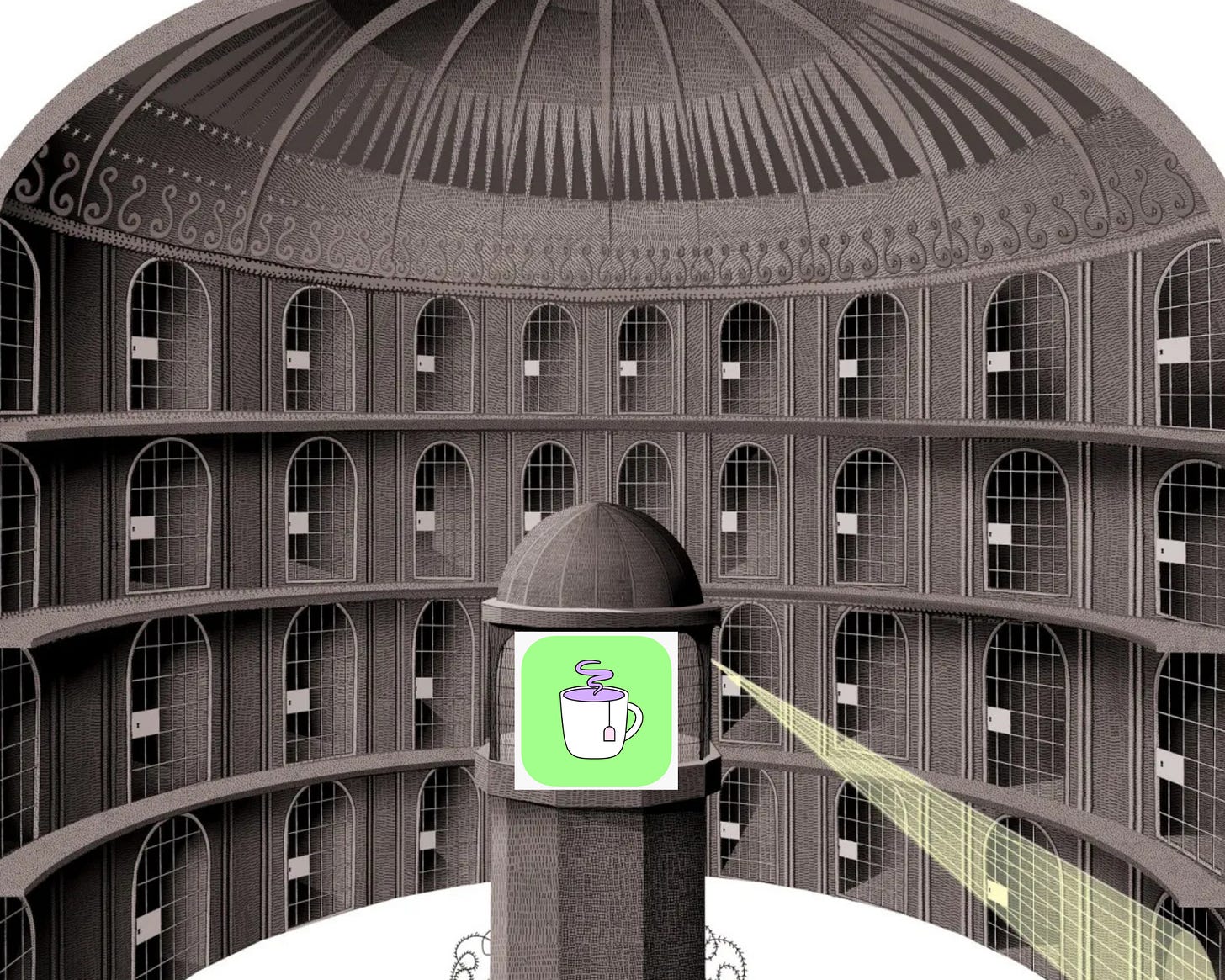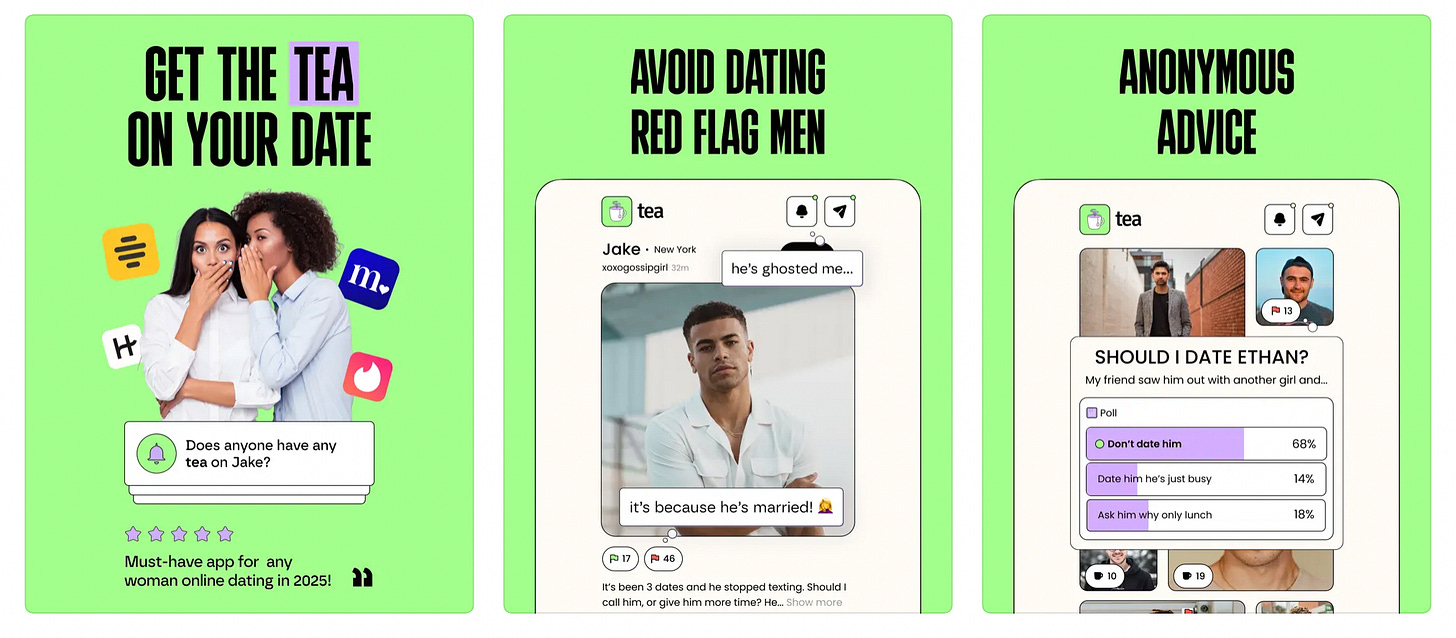Gender Relations Have Made Dating a Hostile Act
notes on the Tea app, "The Problem with Wanting Men" and the Coldplay kisscam
Hello and welcome to Many Such Cases.
It was only a matter of time before the voyeuristic swirl of social media and the flattening of the romantic market via dating apps combined in an app like Tea. Over the last few days, Tea, a “dating safety for women” app, has hit the number one slot in the Apple App Store. It allows its users (only women) to post names and pictures of various men in their circles, highlighting their “red flags.” Some women post men as warnings to others of a man’s behavior — ranging from transmitting STIs to ghosting, literal crimes to liking other girl’s photos on Instagram. Most, however, simply post a picture of a guy they’ve matched with on Tinder or are otherwise talking to, asking for any “tea” or gossip about him.
This sort of paranoid, antagonistic attitude isn’t new. “Are We Dating the Same Guy?” Facebook groups have been flourishing for years, as have viral stories like West Elm Caleb and Harry Sisson’s snapchat scandal. We’re living in the midst of a digital dating panopticon, and some of us are more than happy to perpetuate a sexual surveillance state at our own expense. The Tea app now makes it easier than ever.
Many women especially, I think, are approaching dating with defensiveness and hostility. As I mentioned at the time of the Sisson story, the goal in dating is not to form a connection or even have fun, but to avoid the possibility of embarrassment. For women, the embarrassment to avoid is that of dating a man who is dating other women, or sleeping with a guy who doesn’t text you back. For men, the embarrassment to avoid is being posted on apps like Tea, or otherwise becoming fodder for more viral Internet drama. In both cases, this fear of embarrassment leads to retreat. Why date at all when the stakes are perceived to be so high?
Some fear of embarrassment, or even fear in general, is warranted. What’s most insidious about Tea is that it banks on this without differentiation. Men who hit women are posted alongside guys who went through a shitty breakup with their high school girlfriend a decade ago, or guys who have yet to even be accused of having any “red flags.” Here again, a blanket antagonism is being fostered, one that could potentially obfuscate the boundaries of actual bad behavior. We as women are not any safer for it.
But where did this hostility itself originate? The New York Times Magazine story this week, “The Trouble with Wanting Men,” circles around some possibilities. The essay focused on one woman’s own unsatisfying dating life in the context of the rise in heteropessimism, or the general negative attitude some straight women have toward the prospect of forming relationships with men. It’s gotten so bad, she wrote, that heteropessimism has now given way to heterofatalism — what’s the point in trying at all?
As with why women would be interested in Tea, I’m sympathetic to the appeal of heteropessimism. Some men — a lot of men! — are avoidant, emotionally unavailable, immature and generally inconsiderate. They are not worthy partners, and they waste women’s time. There are men who abuse women, who hate women, who cheat on them habitually, who manipulate them, who steal their youth. There are men who kill women.
And even among women who do marry men that aren’t completely evil, there are plenty of guys who just kind of suck. They leave all the childcare and domestic work to their wives, they forget birthdays, they expect the woman to forgo her own aspirations for little in return. The bargain of heterosexuality, in all too many cases, does not add up. But it is not a universal truth.
Still, I can’t help but feel that we’re all encouraged to think so. We are all pushed to believe it is guaranteed to happen to us. Certainly, the Tea app would profit from these suspicions.
As the author herself points out, heterofatalism stems from a contemporary inability to try to relate to one another as men and women: “One thing heterofatalism reflects is a persistent lack of faith that those we desire will be able to recognize us as commensurately human,” she writes. “I wonder how much, fearing what we expect and expecting what we fear, we summon the ‘old-fashioned man-woman stuff’ that keeps coming around. A woman comes, a man withdraws; this embodiment needn’t necessarily become pregnant with larger meaning, but it often does. I end up wondering if it is my own fault somehow when the heterosexual dynamic cannot seem to transcend its own tropes, subvert its own symbolism, play out an entirely unpredictable scene.” It seems, though, that so much of this tension stems from our inability to hold several truths at once, that maybe there is some baked in “man-woman stuff” we aren’t ready to abandon, that maybe what we require is some faith in each other. This faith is explicitly what the current state of gender relations wants us to abandon. We’re sabotaging ourselves and others. And for what? To buy a premium subscription to an app?
I can’t help but circle it around to the Coldplay kiss-cam affair of last week, something I originally didn’t even want to talk about at all. It didn’t strike me as worth talking much about from the start: two people I don’t know at a Coldplay concert of all places having a corporate workplace affair… it’s mundane to the point of parody. It’s practically a lyric in a Weird Al song. Of course, the entertainment element here is obvious: it’s pure schadenfreude, watching those two scramble to avoid being seen. If they’d just acted normal, none of this would have happened. It’s the sort of clip that should be compiled into a YouTube video titled “Biggest JumboTron FAILS” and then forgotten about forever. With how big and fast-moving the Internet is, you’d think it’d be worth maybe a quick laugh before everyone moved on. Instead it’s been crystallized into the exact type of moment the digital dating panopticon wants you to be afraid of, an international news story where every detail of your life is scrutinized, exposed and deconstructed. You’re not afraid of being the ones caught on camera, you’re afraid of being their other halves.
There’s always going to be some risk of that. Is that worth the possibility of love and happiness and human connection? What should bother us most about heteropessimism is that I even have to ask.





Underlying all this is the belief that men are worse than women, and that they could be better if they were more like women. Men are immature, irresponsible, emotionally unavailable, unhygienic. Really, why would anyone want one? This view has become completely mainstream.
Well, to men, women are un-fun, nagging, neurotic, needy, and fussy. But we want them anyway. Women are terrible at dealing with spiders, but that doesn't make men think they're better than women overall.
One thing about that Coldplay incident: there's a woman that got caught too.
I... Think the owners of Tea are getting sued either way at this point.
https://x.com/ZTobias114838/status/1948781407859323395